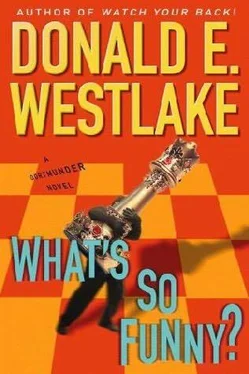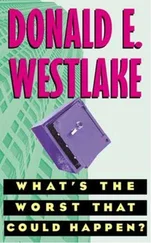WALK. They walked.
"Well, of course we have pictures of it ," she said, more quietly, as they crossed Fifth Avenue. "The entire— Well, the entire you-know was photographed and measured when the law firms accepted custody."
"Measured; that's good, too."
"I could e-mail it all to you," she said.
"No, you couldn't."
They had reached the other curb, where Fiona stopped, waited for the nearby walkers to move on, and said, "I could print it out for you."
"Oh, yeah?"
"That's better anyway. Absolutely no record."
"No record, that's good."
"We'll go back to the office," she decided, and they turned around.
DON'T WALK.
She said, "So you're really going to go ahead and do this, even though you hate everything about the vault?"
"Your grandfather and the other guy like to see forward motion," he told her. "I'm doing what I can to keep everybody happy."
WALK.
Shouldn't he be angry about this situation? Fiona felt he should certainly be angry at her , if not her grandfather, for making this whole thing happen. And yet, he just seemed fatalistic and tired, trying not to go into that vault but sliding there inexorably, after just that one push from her. "I'm sorry, John," she said.
"It isn't you," he said. "What I'm coming to a realization about," he said, as she withdrew from her wallet the card that would let her back into the C&I International building, "is, this is all the mistakes of my past life, coming back to haunt me. In order to pay for all those little misdemeanors and all those little lapses from all the time before I reformed, I gotta do an illegal entry into a bank vault that's impossible to get into and even if you could get into it, which you can't, doubly impossible to get out of, carrying a weight. Half a weight."
During this speech, Fiona had carded them into the building and now led the way toward the elevators, but "Hold on," he said.
Surprised, she turned to see him standing still in the gleaming high-ceilinged gray marble lobby. "Did you want something? The snack shop's closed."
"I wanted to look at it," he said.
"Oh."
So they both looked at the lobby, Fiona trying to see it now through John Dortmunder's eyes, seeing it for the first time, not her own eyes which hadn't really seen the lobby as anything but another blank part of her daily commute for over a year.
The place was very different through his eyes. On their left was the chest-high security station with the wall-mounted TV monitors behind it and the two gray-uniformed security men on duty, whom she'd barely noticed all this time because they knew and recognized her so that she never since the first week or so had had to show her Feinberg ID. But there they were nevertheless, looking in Fiona and John's direction with casual interest because they weren't at this moment in transit across the lobby but simply standing in one place, not a normal lobby occurrence.
What else? The three shops on their right with pane glass windows facing the lobby, selling (1) snacks and reading matter, (2) luggage, and (3) stationery and computer software, were all closed now, though well-lit within.
Across the rear wall of the lobby were the brushed-steel doors of the elevators. To their left was the marked door to the staircase, for emergencies, and to the right of the elevator doors was another brushed-steel door that Fiona had never noticed before. Twice a day she'd passed it, and never noticed.
With a silent glance at her, John walked toward the rear of the lobby. Fiona followed, knowing where he was headed. "I'll get the elevator."
"Good."
They both angled closer to that door on the right, him more so than her, but neither went directly to it, because after all two security men behind them had nothing better to do than watch people moving. However, she was close enough to see — so he must see it, too — that discreet gold letters on the door said NO ADMITTANCE and that it had a card slot like all the other entry card slots in her life, but no doorknob.
"Uh huh," he said, and she carded for the elevator.
Putting the card away in her wallet, she said, "You say you reformed?"
"Right."
"When was that?"
"When I met your grandfather."
"That's what I thought," she said, and the elevator door slid open.
Fiona's access to the Feinberg computer system was not total — there were distant tunnels of data, mostly involving money or foreign linkages, that required passwords beyond her station in life — but much of Feinberg's knowledge was available to her. Being a wee beastie in these offices meant being a utility infielder, on tap to assist any of the more important associates who might need a little delving and precedent hunting done, so her access had to be broad and deep, so quite naturally included the files on the chess set known in the court papers as Chicago Chess Set, its official provenance not going farther back than Alfred X. Northwood's long-ago train journey from that city to New York, chess set in tow.
"Chicago Chess Set," she read from the screen. "Yes, here it is. How much of it do you want?"
"All of it," he said, looking at the cover sheet on the screen, which showed the chess set brightly lit on a black velvet background, set up and waiting, gleaming, looking exactly like something created by royal gold-lust.
"All of it?" She reared back to look at him. "You can't want all of it. The court hearings? There are hundreds of pages on this item of the suits, all by themselves, maybe thousands. You couldn't read all that."
"No, I don't wanna read all that," he said. "I want all the pictures and all the measurements."
"All right, let's see—" She checked the table of contents. "There's individual photos of the pieces—"
"Sounds good."
"Pages of dimensions of each piece."
"Not bad."
"Shots from different angles in different lighting."
"Lay it on me."
"In all," she said, "sixty-four pages."
"I'll borrow an envelope," he said.
Later that evening, over burritos with shrimp and rice — very nice — at their table in their candlelit big room, she told Brian about her latest encounter with John Dortmunder, and he laughed and said, "Is he really gonna try to go down in there and get that thing?"
"Well, he doesn't want to," she said, "but it looks like my grandfather and that other man are pressing him very hard. I just keep hoping they'll all realize it's just impossible and give it up."
"Hard to give up all that gold," Brian said. " I'd know how to get down in that vault."
"You would? How?"
"Say I'm shooting a documentary," he said. "Movie people can get in anywhere. 'Hi, we're doing a Discovery Channel special on bank vaults. How did you spell your name again? You're right in."
Laughing around her burrito, she said, "Oh, Brian, I don't think Mr. Dortmunder could convince anybody he was making a movie for the Discovery Channel."
"No, probably not," Brian said. His eyes glittered just slightly in the candlelight. "Too bad."
SATURDAY MORNING, AFTER May left for the Safeway, Dortmunder sat at the kitchen table and spread out the photos and spec sheets he'd been given by Fiona Hemlow last night. The chess set turned out to be a little smaller than he'd imagined, but also heavier: 680 pounds. Yeah, that would take more than one guy.
According to what it said on the description sheets, the chess pieces weren't actually gold all the way through, which would make them even heavier, but gold poured into forms around wood dowels, with three to five jewels set into each piece to make the two teams: pearls for the white gang, rubies for the red. The kings and queens were just under four inches tall, the others shorter. The gold had been shaped with extreme delicacy and care, as you would do if you were working for an absolute monarch.
Читать дальше












